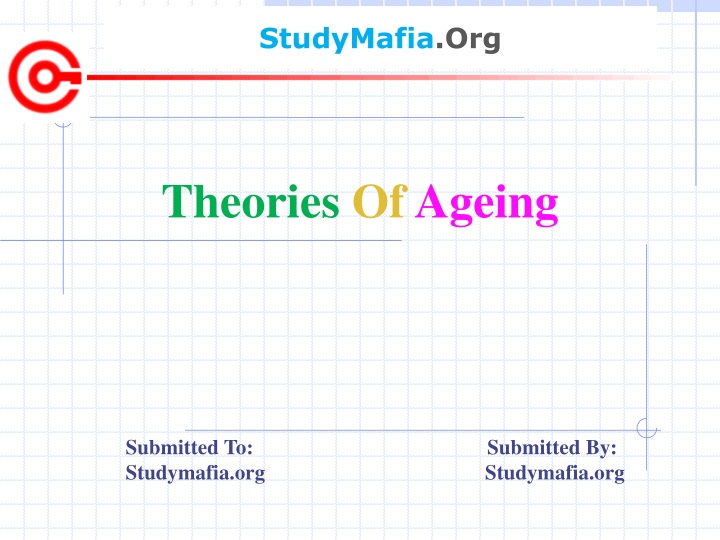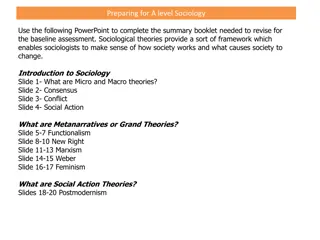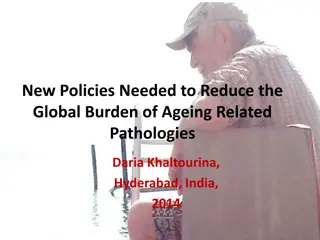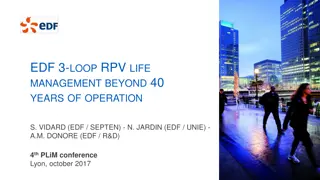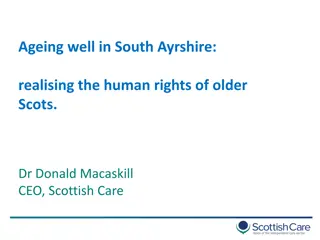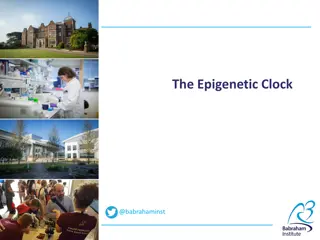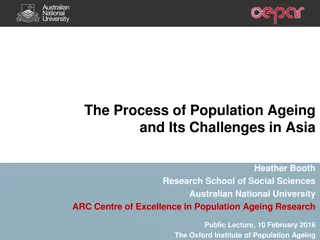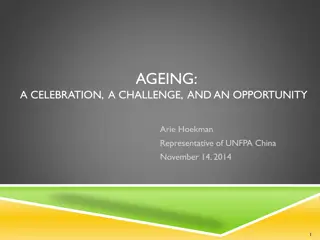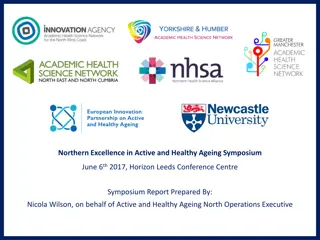Theories of Ageing: Exploring Perspectives on Growing Old
Aging is a natural process involving physical, mental, and social changes. Various theories such as the Activity Theory, Continuity Theory, and Disengagement Theory offer insights into how individuals age and adapt to life transitions. Understanding these theories can help in promoting healthier aging and improving quality of life in older adults.
Download Presentation

Please find below an Image/Link to download the presentation.
The content on the website is provided AS IS for your information and personal use only. It may not be sold, licensed, or shared on other websites without obtaining consent from the author.If you encounter any issues during the download, it is possible that the publisher has removed the file from their server.
You are allowed to download the files provided on this website for personal or commercial use, subject to the condition that they are used lawfully. All files are the property of their respective owners.
The content on the website is provided AS IS for your information and personal use only. It may not be sold, licensed, or shared on other websites without obtaining consent from the author.
E N D
Presentation Transcript
StudyMafia.Org Theories Of Ageing Submitted To: Submitted By: Studymafia.org Studymafia.org
Table Contents Definition Introduction Theory of Ageing Types of Ageing The Ageing Process How to Slow Ageing Conclusion 2
Definition Aging is the process of growing old. It involves physical, mental, and social changes. Research studies provide data about aspects of aging such as health, retirement, and quality of life. 3
Introduction Other theories, more properly called hypotheses, are smaller in scope and address the question, How do we age? Theories are developed from research data and attempt to explain the how and why of aging. There is no central theory that explains aging. Psychosocial theories focus on the mental and emotional as well as social aspects of aging. Three major psychosocial theories on aging are continuity theory, disengagement theory, and activity theory. 4
Theory of Ageing Activity Theory Gerontologist Robert J. Havighurst developed the activity theory of aging in 1961. It is based on the idea that older people who are active are more satisfied with their lives than those who are not. As people age, their social roles change. For example, when a person retires, they are no longer in the social role of employee or breadwinner. When children grow up and move out, the aging parent is no longer in the role of caregiver. 6
Theory of Ageing Continuity Theory The continuity theory of aging is mainly attributed to the separate work of sociologists George L. Maddox in 1968 and Robert Atchley in 1971. The theory is based on the idea that as people grow older, they continue with the same personality traits and level of activity that they had in younger years. Continuity theory distinguishes between an individual's internal and external structures. 7
Theory of Ageing Disengagement Theory The disengagement theory of aging was proposed by social scientists Elaine Cumming and Warren Earl Henry in 1961. It is based on the assumption that as people grow old, they gradually withdraw, or disengage, from society as their physical and mental abilities decline. The theory claims that disengagement from society in old age is not only natural, but desirable. 8
Types of Contraceptive Methods Biological Ageing Most people will live to experience aging. Age-related deterioration is affecting an ever-growing number of people. Although the process is unavoidable, it is important to understand the process. As a physiotherapist, we might be able to positively influence aspects that maintain or engender better health and wellness as a person ages, treating and ameliorating symptoms of common conditions associated with aging. 9
Types of Contraceptive Methods Psychological Ageing This type of aging is largely related to behavior, but it also includes general perception and reactions to the immediate environment. Psychological aging is related to changes in the brain and, in some cases, underlying psychological issues or changes in cognitive capabilities that could affect problem-solving, emotions, and subjective reactions to situations. 10
Types of ContraceptivMethods Social Ageing Social aging refers to how social habits and behaviors change over time. It also includes the individual s role in relation to society as a whole and people in his or her age group. This type of aging is measured, in part, by how an individual is expected to behave in interactions with others based on social norms. 11
The Ageing Process Our age-obsessed culture is consumed with "slowing down aging" and increasing longevity, but the basic truth of it all is that growing old is unavoidable. No matter what you do, your body will change in a number of key ways. 12
The Aging Process For example, by the time a person turns 20, lung tissues will begin to lose their elasticity, the muscles around the rib cage will start to deteriorate, and the overall lung function will gradually begin to diminish. Similarly, the production of digestive enzymes will begin to slow as we age, which affects how nutrients are absorbed into the body and the types of food we can digest without difficulty
How to Slow Ageing Eat well: Added sugar, salt, and saturated fat wreak havoc on the body, increasing the risk of hypertension, diabetes, and heart disease. Read labels: If you buy packaged foods for convenience, check the label to ensure that you limit your sodium intake to under 1,500 milligrams (mg) per day, your sugar intake to around 25 mg per day, and your saturated fat intake to less than 10% of your daily calories. 14 14
How to Slow Ageing Stop smoking: Quitting cigarettes improves circulation and blood pressure while drastically reducing your risk of cancer. Exercise: Most adults do not meet the recommended exercise requirements for good health (roughly 30 minutes of moderate to strenuous exercise 5 days per week). 15 15
How to Slow Ageing Socialize: Socialization keeps us psychologically engaged and may help influence longevity as well. Get ample sleep: Chronic sleep deprivation is linked to poorer health and shorter life spans. Reduce stress: Chronic stress and anxiety can be damaging to your body as they trigger the release of an inflammatory stress hormone called cortisol. 1616
Conclusion The acceptance of aging is essential to your physical and emotional well-being. If you fixate on getting old, you are more likely to overcompensate by exercising too much or embarking on diets that may do more harm than good. 18
Thanks To StudyMafia.org
